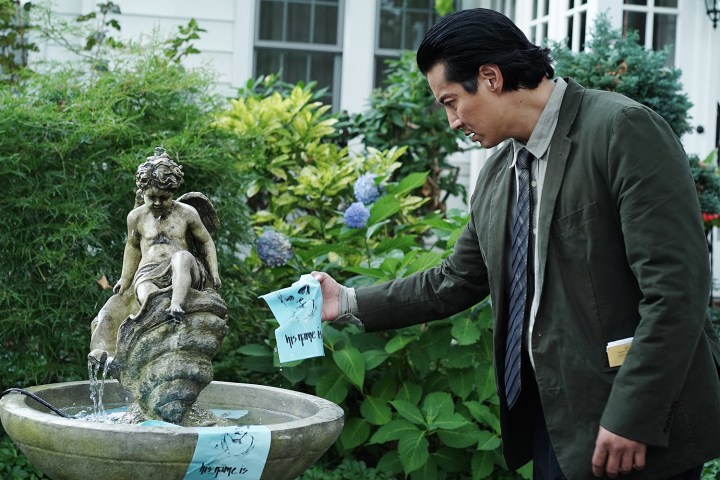
Life may be stranger than fiction, but USA Networks is trying to narrow that gap.
On the heels of the Emmy success of hacking counterculture hit Mr Robot, USA Networks is dreaming up a whole new reality. Falling Water follows three characters: Tess is a photographer, Burton a crisis manager, and Taka a police officer with a mother in a catatonic state. Each has a job that requires them to ascertain what other people want and what is best for them. Each has cryptic dreams that bleed into each other’s reality — until they realize they can flow into each other’s dreams.
The creators of the show — The Walking Dead executive producer Gale Anne Hurd and Brotherhood creator Blake Masters — came together in New York City for a conversation about the science of dreams, neuroscience, and dream recording. They were joined by one of those neuroscientists: Kellogg School of Management professor Moran Cerf, who six years ago helped the world believe scientists could actually record people’s dreams. Cerf says television has had an immense influence on our dreams; the change from black-and-white to color TV helped people dream in color, he claims. That weekend Game of Thrones binge is why you can’t close your eyes without seeing the inside of a dragon’s mouth.
“Mr. Robot came in and these shows that were pushing the cinematic boundaries of television, and we want to be the next step.”
Following the conversation, Digital Trends sat down with Hurd and Masters to find out what exactly is going on in Falling Water, why the show owes credit to Game of Thrones, how often Oprah can enter people’s dreams, and more.
Digital Trends: What does the title Falling Water mean?
Blake Masters: It’s actually a really simple metaphor, that the boundary between our dreams and reality are permeable, like a waterfall. So, when water falls in the show, it’s like a permeable barrier — how people go from dreaming to waking states.
Gale Anne Hurd: You’ll see a lot of that imagery in the show. It’s one of the reasons we really wanted to film in New York where there’s connections like bridges. But there’s rain, there’s the rivers.
Masters: It’s a repetitive sense of imagery to help the audience figure out where we are in the world.
Blake, you said earlier that the idea for Falling Water originated in 2008. What’s changed about the show since then?
Masters: Actually, the idea originally came in ’06. [Henry Bromwell and I] didn’t write it until ’08. The biggest thing that’s changed is television caught up to us. Gale came onto the project in 2013, right before Henry died, and television between ’08 and ’13 had changed. Game of Thrones came on the air. We had gone out of The Sopranos world, and into one that wanted a little more magic. Mr. Robot came in and these shows that were pushing the cinematic boundaries of television, and we want to be the next step.
Speaking of Mr. Robot, Falling Water seems to have a complicated relationship with technology. The same person who says that connecting through dreams is better than any Wi-Fi also uses a cell phone to track people. How does technology work in a show about dreams?
Masters: Well, I think the idea is in the long run, what we would call “holistic non-technology” and technology are flip sides of the same coin and becoming one thing. Bill’s idea is the human mind is the ultimate technology.
Hurd: And we have the ultimate connectivity if we can enter into each other’s dream. If we can meet in a world of our dreams, a far more powerful place that doesn’t have the same laws of physics and et cetera that our waking world has. It’s a much more powerful world.
Any TV shows or books inspire the making of Falling Water?
Masters: I think the biggest creative inspiration were the novels of Haruki Murakami. He’s a Japanese author who wrote Kafka on the Shore, The Wind Up Bird Chronicles, and 1Q84.
Connectivity is central to Falling Water. We live in a world where social media has linked people and connected billions. But how does social media affect your dreams?
Hurd: Just like social media, you can be trolled in your dreams. It can be a benevolent force, it can help you solve issues. Every one of our character has someone they are trying to connect with. The easiest and most powerful way is in their dreams — but there are other people who maybe don’t have benevolent intentions. So it’s interesting, because social media is very much like that. We have a way to connect with people we admire, but people can anonymously attack you on social media.
Masters: I think the general mythology of the show strangely does imitate the cloud almost. The cloud is not good or bad; what people do in that space can be good and can spread good. But if you think about it, if you’re a bad person who can invade people’s dreams and spread bad, then they’ll go on and spread it beyond that, like a cancer. So if you want to talk metaphorically, the way we treat that common dream we’re all dreaming is the way we treat social media and our digital spaces. The spaces are neither good nor bad. What we do in those spaces defines them.
“Just like social media, you can be trolled in your dreams.”
The one thing I notice about the show is that there are no obvious visual cues to indicate when the characters are in a dream or a waking state. Was that intentional?
Masters: Completely intentional, because when I dream, I don’t dream dutch angles and distorted lenses.
Hurd: Or in black and white.
Masters: Or in black and white. I dream very much in a first-person experience. Actually, Juan Carlos Fresnadillo, who directed the pilot, was very clear in the pilot that you travel in a dream. The camera should travel with the dreamer, because that’s how we actually dream. The goal was not to go, “look what we can do that’s cool with our camera,” but instead to replicate for the audience the psychological emotions of dreaming.
There is a lot to unpack in Falling Water in order for the viewer to get used to the intermixing of reality and dreams. Besides a brief mention in the first five minutes of the pilot, the viewer doesn’t really get into the connectivity of dreams until about 40 minutes into the episode. How did you structure the series to tell the story without losing the viewer?
Hurd: [The pilot] is an introduction to each one of the characters and tries to get a sense of what it is they are seeking: What their lives are like, and what their lives are like before they find out the power they have as powerful dreamers. So you need to set that up. You need to see people and ground them, so as viewers we are grounded with those characters instead of jumping straight in.
Masters: We’re not trying to do a show that’s all about mythology and mystery. In fact, the mythology is a landscape. What we’re interested in is the human journey of these people within this world. All my personal favorite sci-fi is about man in a landscape. A foreign land, the future, the past, whatever. It’s all about the human journey. For us, introducing the dreaming is something we did slowly. What we wanted to focus on was the individual longing and journeys of the three leads. The woman looking for her child, man looking for his lover, son trying to reach his mother. That’s really the through line of the show.
A show as unconventional as Mr. Robot succeeded because the writers were highly meticulous on the technology details. How much science went into writing this show? You just had Moran Cerf, a neuroscience explain how watching someone’s dreams is feasible…
Hurd: You know what? We only found out about [Cerf’s work] after we finished the first ten episodes. Yeah, I have to credit Alexandra Shapiro from USA Network who said “by the way, you may think this is really out there. It turns out it’s not that far away from where we are now.” Which is always the coolest thing.
Masters: What we say about science is Henry and I originally approached this from — both our mothers are Jungian psychologists — so we approached this from a psychoanalytic point of view, originally. As we got into it, I took a course with William Dement, the guy who discovered REM sleep. As did Gale, actually. So, there’s a whole science about sleep and dreams that has been around for years and years and years that is embedded in the show. What I didn’t know is where neuroscience has gone in the last 10 years.
Describe to me a vivid dream that you are still trying to figure out.
Masters: Most of my dreams I know. [Laughs] I once had a dream that Oprah Winfrey berated me for being a bad person — and I still have no idea what Oprah is doing in my dreams. But I think Oprah has the power to enter people’s dreams.
Hurd: It’s interesting because you [motions towards Masters] don’t even know this. I once imagined myself in a white space that, depending on how I approached it, was either very confined so I couldn’t get out of it, or infinite. So, I could keep running and never run out of the white space.
Falling Water premiers on USA Network on October 13 at 10 p.m. ET.




